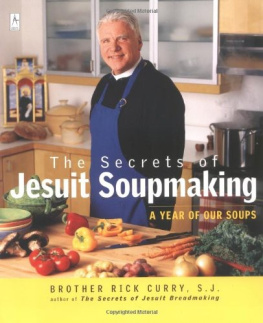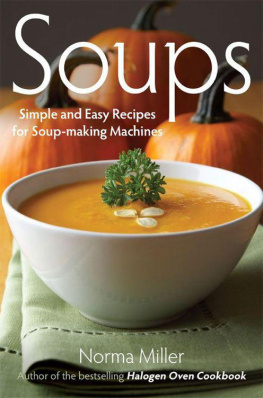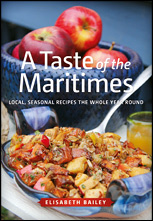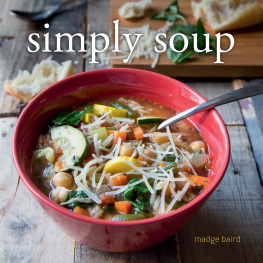Table of Contents

RICK CURRY, S.J., PH.D., entered the Society of Jesus in 1961. In addition to being a Jesuit Brother for more than forty years, hes also an actor, a master baker, a teacher, and a cookbook author. He is the founder and director of the National Theatre Workshop of the Handicapped, a nonprofit acting school for persons with disabilities, which began in New York City in 1977 and has grown to include the first residential facility of the arts for persons with disabilities. Brother Curry holds a master of arts in theater from Villanova University and a doctorate in theater from New York University. He has been honored by the president of the United States with a Distinguished Service Award of the Presidents Committee on Employment of People with Disabilities, and has been awarded two grants from the National Endowment for the Arts. He lives in New York City and Belfast, Maine.

PENGUIN COMPASS
Published by the Penguin Group
Penguin Putnam Inc., 375 Hudson Street,
New York, New York 10014, U.S.A.
Penguin Books Ltd, 80 Strand,
London WC2R 0RL, England
Penguin Books Australia Ltd, 250 Camberwell Road, Camberwell, Victoria 3124, Australia
Penguin Books Canada Ltd, 10 Alcorn Avenue, Toronto, Ontario, Canada M4V 3B2
Penguin Books India (P) Ltd, 11 Community Centre, Panchsheel Park, New Delhi - 110 017, India
Penguin Books (N.Z.) Ltd, Cnr Rosedale and Airborne Roads, Albany, Auckland, New Zealand
Penguin Books (South Africa) (Pty) Ltd, 24 Sturdee Avenue, Rosebank, Johannesburg 2196, South Africa
Penguin Books Ltd, Registered Offices:
Harmondsworth, Middlesex, England
First published in Penguin Compass 2002
Copyright Rick Curry, 2002
All rights reserved.
LIBRARY OF CONGRESS CATALOGING-IN-PUBLICATION DATA
Curry, Rick, 1943-
The secrets of Jesuit soupmaking : a year of our soups / Rick Curry.
p. cm.
Includes index.
eISBN : 978-1-440-68423-4
1. Soups. 2. Jesuits. I. Title.
TX757 .C87 2002
641.813dc21 2002029000
. Paul
http://us.penguingroup.com
To my friend John Waldron Donohue, S.J.
Mentor, author, scholar, raconteur, homilist,
and faithful priest of the Society of Jesus
who continues to strengthen my gratitude for
and enthusiasm in being a Jesuit.
A Note on the Title and the Use of the Term Ours
DOCUMENTS FROM ROME that we read as novices always looked rather foreboding. These official communications from the Curia (the Jesuit headquarters in Rome) came covered in dull book jackets, and the print was ancient. You never really expected to find good news in those pages. Some of the documents were required reading, and some you had to read more than once. Stamped on the covers in large print, the Latin read Ad Usum Nostrorum Tantum (For the Use of Ours Only).
This use of the word Ours to refer to members of the Society of Jesus gradually crept into our everyday language. Instead of a Jesuit asking the question Is he a fellow Jesuit? he would simply inquire, Is he one of Ours? I love the use of Ours in this way, because it connotes membershipa sense of belongingin the Brotherhood of Jesus.
When I was trying to think up a subtitle for this book about Jesuit soups, I couldnt conjure up a better one than A Year of Our Soups, to convey this strong sense of Jesuit identity.
A Note on the Stories
THE STORIES YOU WILL RUN ACROSS in this book are true, but I must warn you that I adhere to the Jesuit distinction between myth and truth. As John Courtney Murray, S.J., was once purported to have said, A myth is that which never happened, but is forever true. My great friend Father Jack Alexander, S.J., told a wonderful story that absolutely delighted his audience and at the end of it a rather wet-blanket type of Jesuit came up to him and said, Jack, I was there when that happened, and thats not exactly the way that story goes. Jack replied, Hey, pal, you tell the story exactly the way it happened and see if you get a laugh.
This book is my attempt to capture the learning and memory that went into my soupmaking as a Jesuit brother. I hope that when you make these tangible recipes, some of Our traditions intangibles may also reach you, for in the simplest acts, one may find the service of God.
Acknowledgments
ALL PRAYERS SHOULD BEGIN with gratitude, and in that spirit I begin this book with thanks to all who directly or indirectly helped me complete it.
Firstly, to John Spalla, dean of the National Theatre Workshop of the Handicapped who cleared all of my appointments by generously taking over my workload.
My thanks also go to Brothers Jim Horan, S.J., Jack McLane, S.J., and John Buchman, S.J., who taught me so much working alongside them in novitiate kitchens. And to John W. Donohue, S.J., of America magazine, who so generously read the manuscript and kept me on the straight and narrow with helpful suggestions.
Deep affection and gratitude go to my agent, Tom Colchie, who calmed several troubled waters, as well as to his lovely wife, Elaine, whose editorial help was invaluable. Lastly, special thanks go to Kevin Curtin, friend and scholar, who helped give poetry to the text, as well as to Ken Boller, S.J., and John LaRocca, S.J., who are my Jesuit cooking colleagues.
Introduction
Light-Up
ITS 5:30 ON A BEAUTIFUL, crisp clear morning in October. I almost anticipate the bell, ringing to awaken us in the novitiate. The house is now particularly solemn because the first-year novices are on their long retreat of thirty days. Although this hour is usually serene, the silence seems more profound this morning. It is cold. I will not rise, shower, and prepare for the first visit as usual, because this morning Im on light-up. I leap out of bed, kneel down, and kiss the floor, which is our humble gesture to offer our day entirely to almighty God. I get up, jump into my pants, throw on my manualia jacketa light cotton waiters jacket that we wear in the novitiate in lieu of our cassockthrow a towel over my shoulders while clutching my toothbrush and toothpaste, and run across the hall into the bathroom. I brush my teeth, throw water on my face, dry very quickly, and run downstairs to the kitchen.
The kitchen in the morning at Wernersville is sacred space. It is quiet as I look at all the equipment in the kitchen, which serves our men so well, awaiting like silent serpents to hiss into action. I kneel and turn on all of the spigots that activate the heat. I also turn on the oven and the top burners to begin boiling water. This is known as light-up. Looking around our kitchen, I see that the brothers from the night before have laid out much of the work, not only for breakfast, but for dinner and supper as well. Immense pots filled with bones and water sit on the stove on a low flame, making a beef stock. In another large vessel, chicken bones quietly simmer into their stock. Below the kitchen, I can hear bread pans rattling, as the brother baker puts the corn bread into the oven for breakfast. It is now time for me to look on the desk of the brother cook, and note his instructions to me for beginning the work that day.
After this duty, I slip upstairs to my room to make my hour meditation, and then join the community for Mass at eight. By the time I arrive at Mass, I feel as though I have already completed a large part of my days work during light-up: I was the first one awake to prepare the house, to begin another day in our religious lives. Yet, in a sense, our order never sleeps, never lets the kitchen fire go wholly outjust as the Celts kept their hearths perpetually alight in ancient days. Even in the dark of night, there is a presence, a continuity of care for this kitchen that sustains us from one day to the nexta light in darkness.
Next page













